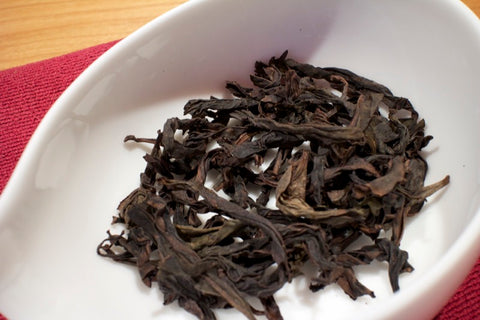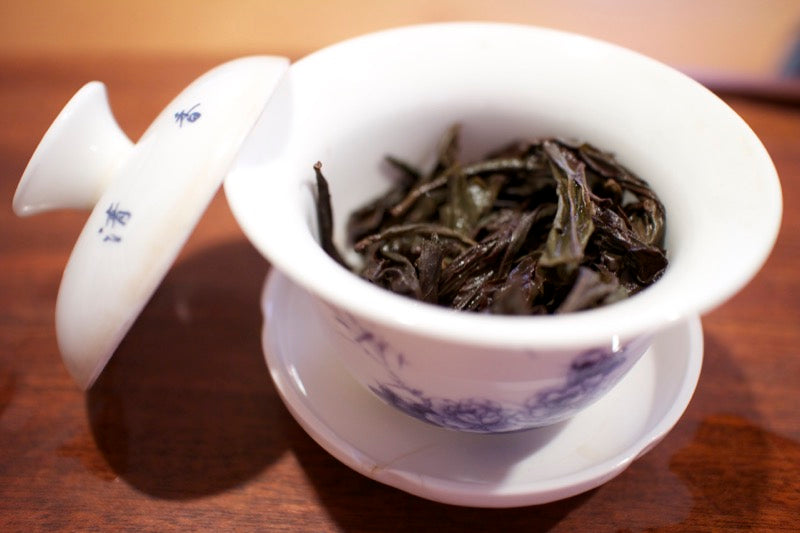Niu Lan Keng Rougui
At nannuoshan we have been drinking Wuyi Rock Tea barely every evening in the last couple of weeks. We did that to refresh our memory and get ready for Niulankeng.
Rock teas are complex. Three main tastes share the field and harmonize with each other: the mineral, the toasty, and the fruity. We wanted to experience again all the different nuances that Rock Teas can offer before tasting Niulankeng Rougui.
Rougui is a popular Wuyi Rock Tea. Niu Lan Keng is an area on the Wuyishan mountain where the most famous Rougui plants are cultivated.
Rougui Niulankeng is estremely rare and expensive. It is hard to get the hands on it and the price is always intimidating. Last spring we were offered 500 grams of tea in exchange of 8000 Yuan (1000 euro, 1200 USD). And this was the wholesale price! Imagine which would be the price for the customers after adding shipping cost, customs taxes and the seller's profit margin.

We equip the gonfu cha tray with a 110ml gaiwan, the pitcher and cups for the three of us. We slide 3g of leaves into the lotus and the niulankeng experience starts.
The leaves are not very dark and some still have a greenish shine; probably the oxidation level wasn't as high as in other Wuyi Yan Cha (aka Rock Tea). The smell of the dry leaves reveals a quite roasted oolong though. The toasty smell is dominant, but not unpleasantly strong, as sometimes the case.
We wash the leaves with hot water to wake them up and rinse the cups; fill them again and start tasting.
Marcella: "Mmm, that's mineral!"
Lea, with a concentrated and doubtful gaze: "Mineral? For me it is rather fruity."
Marcella, knowingly: "No, we had more fruity oolongs in the last days. But this is more... it is fuller."
(Marcella and I tasted many oolongs together in the past days, while Lea just came over for niulankeng)
Curiously, no one even mentioned a roasted flavor, that was so clear and dominant in the smell of the leaves.
With the second cup we strengthen our thoughts. For Marcella this is the best Rock Tea she ever tried, but she expected more from it. The price is not justified. Personally, I am even not sure this being the best I tried. In the next days I will compare it with other two Wuyi Rock Teas that might compete with it.
All in all, it is an extremely balanced Rock Tea with a rich mineral base, stone-like and palate-stimulating. The sweet fruity hints noticed by Lea are always present, especially when breathing out through the nose after having drunk.
We continue drinking. The third infusion is weaker and we all agreed that the first one was the best. Strange! We would expect the tea to further evolve at least up to the third cup, instead of fading out so quickly. With the forth infusion we try a longer steeping time (70" instead of 45") at a lower temperature (85°C instead of 90°C). The tea is anyway less intense. In an attempt of getting more out of it, we try then a steeping time of one minute at 100°C. No change.








In a nutshell, Niulankeng Rougui is a full-bodied, rich and mineral Rock Tea. Richer and deeper than most Rock Teas available on the Chinese market. Roasting is well balanced with the mineral base and the clear sweet-fruity hints.
Despite being an excellent Rock Tea -one of the best we ever tasted,- we don't believe that its price is justified. It does not stand out from other more affordable Wuyi Yan Cha as we would expect and the yield is disappointing: the third gongfu cha round was already weak.





